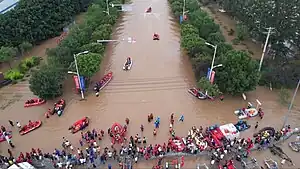 Rescue workers evacuate flood-affected people in Zhuozhou. | |
| Date | July 2023 – August 2023 |
|---|---|
| Location | China Beijing and Hebei (most affected), Shanxi and Dandong (partially affected) |
| Deaths | ≥81 |
Several floods struck China starting in July 2023, most of them caused by heavy rainfalls in different areas. The most notable floods were the 2023 Beijing-Tianjin-Hebei Heavy rain and Northeast china heavy rain, which left at least 81 dead and 34 missing.[1]
Abnormal Rainfall
Sichuan Province
As of July 4, 461,000 people were affected in 69 counties (cities and districts) of 16 cities (states) in Sichuan, including Chengdu, Deyang, Mianyang and Guangyuan. Heavy to heavy rainfall occurred in most areas of Chongqing, and many rivers in Jiangjin, Qijiang, Fengjie, Wanzhou and other places experienced over-alarm and over-guaranteed flooding.From 8:00 p.m. on July 3 to 8:00 p.m. on July 4, 24 districts and counties in Chongqing experienced torrential rain, and extraordinarily heavy rainfall occurred in Wanzhou District, with the maximum daily rainfall occurring in Baiyan Village of Changtan Township of Wanzhou, amounting to 251.5 millimeters.[2]
Beijing-Tianjin-Hebei Heavy rain
Weather warning
Typhoon Doksuri made landfall in Jinjiang, Fujian, on July 28, then rapidly weakened once inland and dissipated shortly thereafter.[3][4] Later that afternoon, National Meteorological Center of CMA issued a red alert—the highest level warning for heavy rainfall—this was only the second time a red rainfall warning had been issued—since the warning system was formally implemented in 2010.[5][6] The first time was on September 29, 2011.[7] The Hebei Provincial Meteorological Bureau upgraded its warning to a red alert for torrential rains.[8]
Some parts of Baoding, Xiong'an New Area, Shijiazhuang, Xingtai, and Handan were expected to see especially torrential rains (250-450mm), with local accumulations potentially reaching more than 600 mm (24 in).[9] The average rainfall in Beijing was 276.5 mm (10.89 in); the largest rainfall occurred in Xincun in Shidu, Fangshan District, 500.4 mm (19.70 in); The maximum hourly rain intensity occurred in Qianling Mountain, Fengtai District, at 111.8 mm (4.40 in) on July 31.[10]
Impact

At least 5,000 people were urgently transferred from the mountainous area of Mentougou District.[11] The Beijing Flood Control Headquarters activated the city's flood control red early warning on July 30. Tiananmen Square, the Palace Museum, the Summer Palace, and the Badaling Great Wall were temporarily closed.[12] The China Central Television reported that 31,000 individuals fled their homes in high-risk regions in Beijing.[13] Mentougou District flooded the Yongding River due to heavy rain, and the surrounding main roads were temporarily controlled.[14]
Heavy rainfall caused at least 9 deaths and 6 missing in the province, and more than 540,000 people were affected. Seven flood storage and detention areas were successively used to transfer 840,000 people.[15] Among them, Baoding recorded 350 mm (14 in), and Dingzhou City recorded 319.7 mm (12.59 in) of rainfall.[16]
In early August, flood control systems were used to redirect 1.8 billion cubic meters of water from Beijing and Tianjin to low-lying areas of Hebei Province.[17] More than 850,000 residents were told to evacuate, including 134,000 in Zhuozhou and 113,000 in Gaobeidian.[17][18] While inspecting relief efforts local Communist Party secretary Ni Yuefeng commented that Hebei should "serve as the capital's moat", prompting criticism online.[17]
Response
Xi Jinping, the General Secretary of the Chinese Communist Party and the President of China, urged local officials to make every effort to find individuals who are missing or trapped.[19] The Organization Department of the Chinese Communist Party allocated 44 million yuan of special funds.[20] Chinese Premier Li Qiang called for all-out efforts during rescue and relief operations and stressed that ensuring people's lives and safety is a top priority.[21]
The Ministry of Finance also allocated RMB 842 million in agricultural disaster prevention and mitigation and water conservancy disaster relief on July 31.[22] The Ministry of Agriculture and Rural Affairs announced $60 million in flood relief money to help the region's farm sector.[23]
Northeast China flood
Jilin
Torrential rains and the flooding they caused in Jilin province have killed at least 14 people including senior municipal officials. Most of the fatalities were reported in the small city of Shulan.[24]
Heilongjiang
Flooding is still occurring in the Songhua River basin, causing 85 rivers to exceed emergency levels.[25][26] In Harbin, the provincial capital of Heilongjiang, more than 162,000 people were evacuated, while over 90,000 hectares of crops were damaged by floodwater. In the city of Shangzhi, more than 42,575 hectares of crops were destroyed by the worst rainstorm the city has faced in more than six decades, Xinhua reported.[26]
Controversies
ZhuoZhou the floods were unannounced
Residents in many areas said that the reason for the seriousness of the damage in their areas was that the government did not issue a notice asking residents to evacuate prior to the release of the Beijing Reservoir, and that hundreds of residents in various areas were stranded due to flooding and faced water and power cuts.[27][28]
See also
References
- ↑ "Beijing records heaviest rainfall in at least 140 years, causing severe flooding and 21 deaths". ABC News. Retrieved 2023-08-04.
- ↑ "强降雨导致四川46.1万人受灾 重庆多条河流出现超警超保洪水-新华网". www.news.cn. Retrieved 2023-08-10.
- ↑ 郭凯. "Typhoon Doksuri makes landfall in East China". www.chinadaily.com.cn. Retrieved 2023-08-04.
- ↑ Conroy, Gemma (2023-08-03). "How Beijing's deadly floods could be avoided". Nature. doi:10.1038/d41586-023-01258-9. S2CID 260486872.
- ↑ "內地暴雨紅色預警持續 多個部門部署應對工作 - RTHK". news.rthk.hk (in Chinese (Taiwan)). Retrieved 2023-08-04.
- ↑ "China issues red alert for torrential rain in Beijing". The Manila Times. Agence France-Presse. 2023-07-29. Retrieved 2023-08-04.
- ↑ "華北暴雨持續 中央氣象台近12年來首發暴雨紅色預警". Now 新聞 (in Chinese (Hong Kong)). 2023-07-29. Retrieved 2023-08-04.
- ↑ "暴雨一级应急响应!大暴雨+特大暴雨!河北最新预警→". Weixin Official Accounts Platform. Retrieved 2023-08-04.
- ↑ "暴雨一级应急响应!大暴雨+特大暴雨!河北最新预警→". 河北日报. 2023-07-29.
- ↑ "北京本次降雨超极值 为140年来最大降雨量_中新社_北京分社". www.bj.chinanews.com.cn. 2023-08-02. Retrieved 2023-08-04.
- ↑ 杨雯珺 (2023-07-31). "北京门头沟区山区紧急转移群众5000人左右". 央视新闻. Archived from the original on 2023-08-01. Retrieved 2023-07-31.
- ↑ "京津冀等發布暴雨紅色預警 北京全市景區關閉 - RTHK". news.rthk.hk (in Chinese (Taiwan)). Retrieved 2023-08-04.
- ↑ "China: Typhoon Doksuri floods Beijing, thousands evacuated – DW – 07/31/2023". dw.com. Retrieved 2023-07-31.
- ↑ "北京門頭溝山洪暴發 多輛汽車被沖走多人失蹤". Now 新聞 (in Chinese (Hong Kong)). 2023-07-31. Retrieved 2023-08-04.
- ↑ "TDM". www.tdm.com.mo. Retrieved 2023-08-04.
- ↑ "河北省連日暴雨 至今9死6人失蹤 - RTHK". news.rthk.hk (in Chinese (Taiwan)). Retrieved 2023-08-04.
- 1 2 3 Yuanyue, Dang (2023-08-03). "'The capital's moat': thousands forced from homes in China's Hebei province to ease flooding in Beijing". South China Morning Post. Beijing. Archived from the original on 2023-08-04. Retrieved 2023-08-04.
- ↑ Lee, Liz; Cao, Ella (2023-08-02). "China intensifies flood rescue efforts south of Beijing after historic rains". Reuters. Beijing. Archived from the original on 2023-08-04. Retrieved 2023-08-04.
- ↑ "人民日报-有品质的新闻". wap.peopleapp.com. Retrieved 2023-08-01.
- ↑ "中組部從代中央管理黨費中劃撥4400萬用於支持京津冀等地防汛救災". 香港文匯網 (in Chinese). Retrieved 2023-08-04.
- ↑ "习近平对防汛救灾工作作出重要指示-新华网". 新华网 (in Chinese (China)). Retrieved 2023-08-01.
中共中央政治局常委、国务院总理李强作出批示...
- ↑ "兩部門:緊急預撥1.1億元 支持京津冀地區做好防汛救災工作--經濟·科技--人民網". finance.people.com.cn. Retrieved 2023-08-04.
- ↑ "China sees record flooding in Beijing, with 20 deaths and mass destruction blamed on Typhoon Doksuri - CBS News". www.cbsnews.com. 2023-08-02. Retrieved 2023-08-04.
- ↑ "Record Floods Leave 14 Dead in Northeast China - Caixin Global". www.caixinglobal.com. Retrieved 2023-08-11.
- ↑ "松花江发生2023年第1号洪水-新华网". www.news.cn. Retrieved 2023-08-11.
- 1 2 Zhang, Nectar Gan,Mengchen (2023-08-07). "Deadly floods hit China's major grain-producing region, fueling food security concerns". CNN. Retrieved 2023-08-11.
{{cite web}}: CS1 maint: multiple names: authors list (link) - ↑ "草菅人命! 疑洩洪前未通知 河北涿州多人被困 北京洪災致11死27失聯". Newtalk新聞. 2023-08-01. Retrieved 2023-08-02.
- ↑ Stanway, David (2023-08-10). "What are China's 'sponge cities' and why aren't they stopping floods?". Reuters. Retrieved 2023-08-10.
External links
 Media related to 2023 China floods at Wikimedia Commons
Media related to 2023 China floods at Wikimedia Commons